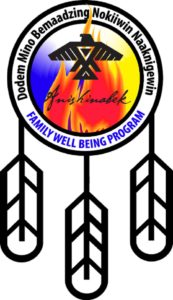Family Well-Being program well underway
 By Laura Barrios
By Laura Barrios
UNION OF ONTARIO INDIANS HEAD OFFICE (Nipissing First Nation)—Various Indigenous partners, including the Union of Ontario Indians, along with the Ministry of Children and Youth Services (MCYS) are jointly developing the Family Well-Being program designed to deliver prevention-focused, culturally-responsive supports in First Nations throughout Ontario.
The Family Well-Being program will support Indigenous children and youth in child welfare and youth justice systems and their families.
“The program actually aims to interrupt the cycle of violence against Indigenous women through the development of policies and resources to support the children and youth affected by violence,” noted Cecile Hookimaw, Family Well-Being Program Coordinator in the Social Department at the Union of Ontario Indians. “These prevention-oriented programs that are developed at the local level will reduce the need to bring children into the child welfare system because they will be supporting families through the least disruptive means possible, tailored to the unique needs of each community.”
The long-term hopes of this program include reducing the number of Indigenous children and youth in the child welfare and youth justice systems; reduce the occurrence of violence in families; and improve the overall health and well-being of communities.
There are three key components at the core of the program that are consistent amongst all participating communities and they are: family well-being workers, community-based programming, and safe places; development of these components will be customized to best fit the needs of their community.
Family Well-Being Workers are front-line staff who will be responsible for ensuring the community-based programming is delivered and building on the pre-existing strengths and the skills within the community.
“The support that these workers will be providing can include: connecting clients to already available community services, coordinating family wellness planning, and providing counselling services and programs to children and youth who have been exposed to or have experienced violence,” stated Hookimaw. “These workers will be a key contact for those children and youth to getting the assistance they need, when they need it.”
Community-based programming recognizes that impacts to child safety and well-being include larger systemic issues such as poverty, poor housing, and substance abuse which require collaboration and coordination of programs and services across geographical regions.
“Some examples of what community-based programming could look like and include are: individual and family sessions on family violence and well-being, systems navigation and advocacy—if they need directions on how to deal with the family court system, family group culture-based workshops and life skills supports,” listed Hookimaw. “There are so many other programmings that are possible. There’s also peer support groups, pre-natal and parenting workshops and supports for all ages and genders, and land-based youth and family programs.”
The program will also include establishing safe places intended to address crisis/emergency situations through appropriate community safety planning, connect children, youth, and families to Family Well-Being Workers or other community-based programs/supports.
“A safe place could be an alternate home to family members that have experienced or have been exposed to family violence,” explained Hookimaw. “So, that safe place could be a home of an Elder, a community centre, or a school that would not stigmatize a woman, her kids, or family if they’re seen there. Through the identification of these safe spaces for children and youth, it will help increase prevention and early intervention efforts as children experiencing violence will already have knowledge about where they can access the necessary supports.”
The second phase of the Family Well-Being Program is now underway.
“With the funding that has come in already, communities have been able to hire their front line workers,” stated Hookimaw. “Some communities are already renting out their safe spaces. One community is even hoping to open up their women’s shelter.”
If there are any communities that require assistance or additional information, call Family Well-Being Program Coordinator in the Social Department at the Union of Ontario Indians, Cecile Hoookimaw at: 705-497-9127 ext. 2237 or cecile.hookimaw@anishinabek.ca


